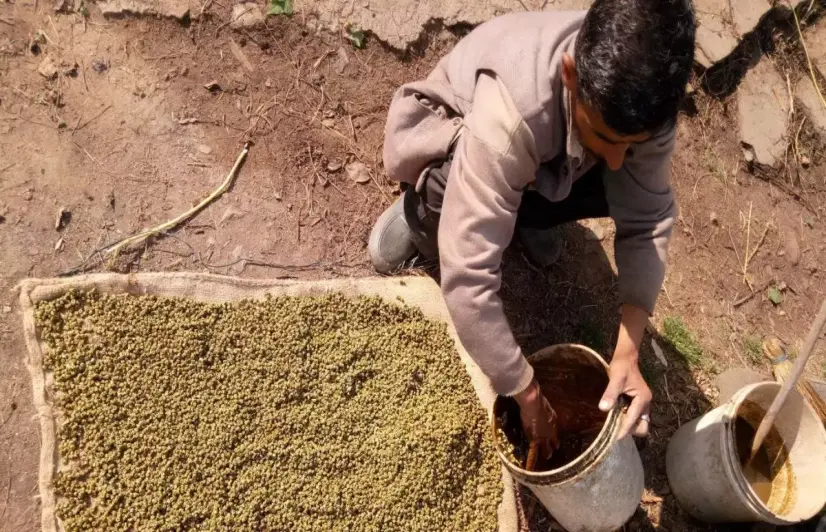Himachal determined to achieve self-sufficiency in seed production

Himachal determined to achieve self-sufficiency in seed production
The state government is keen to reduced the import of seeds from other states which often do not sprout under local conditions, and instead promote native farmer groups who produce these seeds.
Shimla: Agriculture and allied activities contribute to 13.62% of Himachal Pradesh’s gross domestic product. Around 69% of this hill state’s population earn their livelihood from this sector. However, with a steady rise in agriculture cost with each passing day, the number of people involved in agriculture is on the decline and people are migrating to the towns and cities in search of a remunerative livelihood.
The agriculture department of Himachal Pradesh government in a move to reduce the cost of agriculture and produce seeds that are in sync with the local conditions has launched Swarna Jayanti Bheej Samvardhan Yojana. The scheme aims to reduce the import of seeds from other states and achieve self-sufficiency. It also strives to promote locally available seeds and supply them to farmers at affordable rates.
Promotion of local seed varieties will also guarantee that the seeds that farmers buy sprout. This scheme also gains significance in that at present, only 1% of agricultural land in Himachal Pradesh is used for the production of seeds and this meets 20% of the state’s total seed requirements. As the state is forced to import the remaining 80% of its requirements, it has also faced challenges in this regard.
At present, Himachal Pradesh imports 100% of its requirements of maize, barley, peas, millet and vegetable seeds from other states. Besides this, Himachal also imports 90% of its paddy seed requirement, 91% of its oilseeds, 99% of its pulses seeds, 95% of gram seeds, 53% of wheat and 45% of ginger seed. Farmers have often complained that these imported seeds do not sprout locally.
The non-availability of seeds has been a cause for concern for the farmers. To address these issues of production and promotion, the agriculture department has adopted a two-pronged strategy. Accordingly, for the fiscal year 2021-22, the department, keeping in mind the demand of 1.80 lakh quintal of paddy seeds, has set itself a target of producing 96,855 quintals of seed in the state itself.
Out of this, nine registered farmer groups will produce around 95,000 quintals of seeds. The department in turn will procure these seeds from the farmer groups and sell them to other farmers. In the second strategy, the department in a bid to promote natural farming, through the Prakritik Kheti Khushhaal Kisan Yojana (PKKKY) is readying a master plan to produce seeds on the lines modelled by Subash Palekar.
Accordingly, under this scheme, seeds will be produced in 12 out of the 26 farms of the department jointly with 130 other farmers’ associations. The master plan that was drawn under the PKKKY will ensure that wheat, paddy, barley, pea, channa, Indian corn, ragi, coarse cereals are produced locally so that the state’s overt dependence on the import of seeds to meet its local agriculture requirements is pared to a minimum.
These seed initiatives hope to directly benefit around 9.61 lakh farmers in the state, around 80% of who are small and marginal farmers (Picture credit - Rohit Prashar)
The department as part of its seed multiplication drive will collect seeds available with the Indian Council of Agricultural Research (ICAR), Krishi Vigyan Kendra (KVK), Punjab Agricultural University, Dr YS Parmar University of Horticulture and Forestry, National Bureau of Plant Genetic Resources and farmers who have worked for the cause of multiplication and conservation of the seed's resources.
The seeds so produced, will be supplied to farmers later on. According to Rajeshwar Singh Chandel, executive director, Prakritik Kheti Khushhaal Kisan Yojana, the department has formulated this action plan for multiplication and development of seeds and started working on it in consultation with experts and institutions in India and abroad who are working in this area of agriculture sector development.
Naresh Thakur, director, department of agriculture says the department is working on the protection and multiplication of the seeds through the Swarna Jayanti Bheej Samwardhan Yojana. The department has set about this task of seed production on its farms with assistance from farmers to ensure that the state is self-reliant in the vital area of seed production, which assures food security to its population.
Virender Kanwar, the agriculture minister said his department has started the above schemes in a planned manner to ensure that the farmers in the state get the best quality local seeds and on time. “The results of the above initiatives taken by the department will be there for all to see within one year,” Kanwar said, adding the government and his department is committed to coming to the aid of farmers.
Ashish Gupta, trustee, Gram Vikas Trust that works for the preservation of seeds and farmers said seed production has been limited to a very small area in Himachal Pradesh. “We are therefore dependent on other states for our seed requirement,” Gupta said. Many of our old seeds are on the verge of extinction and the move by the state government in this regard is a commendable one, Gupta added.
If the above initiatives undertaken by the department do bring about the intended results, this will in turn directly benefit around 9.61 lakh farmers in the state. Around 80% of farmers in the state are small and marginal farmers. This move by the department to ensure that these farmers get quality seeds and on time will certainly add to their economic well-being and ensure a prosperous life for them, Gupta added.
Would you like to Support us
101 Stories Around The Web
Explore All NewsAbout the Reporter
Write For 101Reporters
Would you like to Support us
Follow Us On

